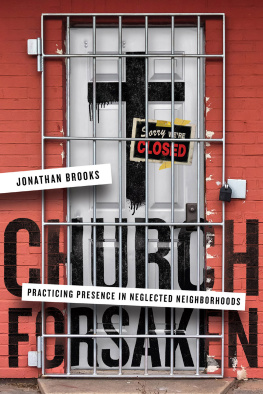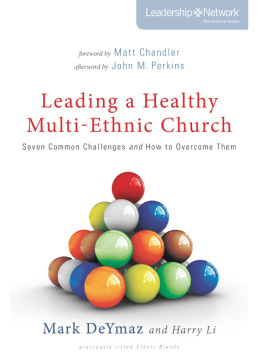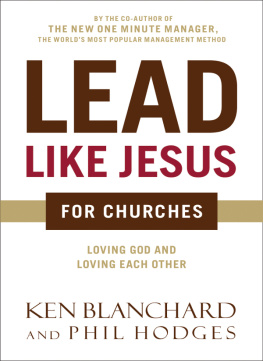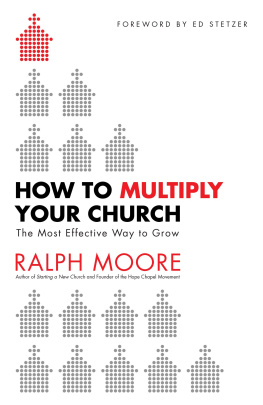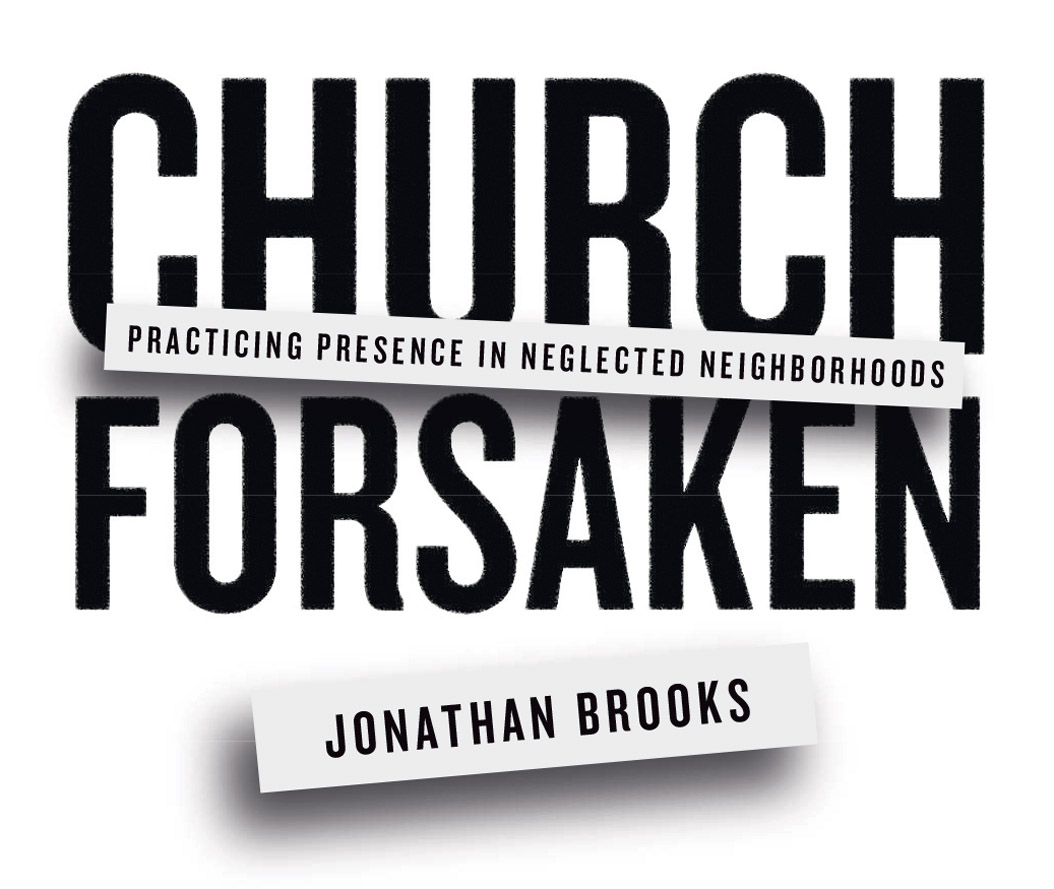Sommaire
Pagination de ldition papier
Guide
InterVarsity Press
P.O. Box 1400, Downers Grove, IL 60515-1426
ivpress.com
2018 by Jonathan E. L. Brooks
All rights reserved. No part of this book may be reproduced in any form without written permission from InterVarsity Press.
InterVarsity Pressis the book-publishing division of InterVarsity Christian Fellowship/USA, a movement of students and faculty active on campus at hundreds of universities, colleges, and schools of nursing in the United States of America, and a member movement of the International Fellowship of Evangelical Students. For information about local and regional activities, visit intervarsity.org.
Scripture quotations, unless otherwise noted, are from the New Revised Standard Version of the Bible, copyright 1989 by the Division of Christian Education of the National Council of the Churches of Christ in the USA. Used by permission. All rights reserved.
While any stories in this book are true, some names and identifying information may have been changed to protect the privacy of individuals.
Cover design: David Fassett
Interior design: Daniel van Loon
Images: church doors: catnap72 / E+ / Getty Images
closed sign: titaniumdoughnut / E+ / Getty Images
grunge design elements: ulimi / Digital Vision Vectors / Getty Images
red wall with secured door: JM_Image_Factory / Istock / Getty Images Plus
spray paint grunge: Thoth_Adan / Digital Vision Vectors / Getty Images
ISBN 978-0-8308-7371-5 (digital)
ISBN 978-0-8308-4555-2 (print)
This digital document has been produced by Nord Compo.
Dedicated to the memory of Martinez Newman.
I promise to always take care of your ladies.
Gone too soon but never forgotten.
Thus says the LORD of hosts, the God of Israel, to all the exiles whom I have sent into exile from Jerusalem to Babylon: Build houses and live in them; plant gardens and eat what they produce. Take wives and have sons and daughters; take wives for your sons, and give your daughters in marriage, that they may bear sons and daughters; multiply there, and do not decrease. But seek the welfare of the city where I have sent you into exile, and pray to the LORD on its behalf, for in its welfare you will find your welfare. For thus says the LORD of hosts, the God of Israel: Do not let the prophets and the diviners who are among you deceive you, and do not listen to the dreams that they dream, for it is a lie that they are prophesying to you in my name; I did not send them, says the LORD.
For thus says the LORD: Only when Babylons seventy years are completed will I visit you, and I will fulfill to you my promise and bring you back to this place. For surely I know the plans I have for you, says the LORD, plans for your welfare and not for harm, to give you a future with hope.
JEREMIAH 29:4-11
FOREWORD
SHO BARAKA
A nything will give up its secrets if you love it enough. This pithy statement came from the revolutionary botanist George Washington Carver. Some say he single-handedly saved southern agriculture from soil depletion with his plant-based discoveries. Droves would travel across time zones to hear Carvers brilliance. Science had never spawned such an agrarian innovator.
Just as notable as his contributions was his posture of humility. This is because Carver knew the secrets to his success were not his. The secrets of flourishing were revealed in his compassionate transactions with Gods creation. Carver parried offers of promising wealth to continue his revolutionary practices at a demure Tuskegee Institute. The masses were perplexed and unsatisfied with his answers, but in his unassuming way Carver revealed, Not only have I found that when I talk to the little flower or little peanut it will give up its secrets, but I have found that when I silently commune with people they give up their secrets also.
At this same modest institution I met Jonathan Brooks, or John as I came to call him. Our friendship blossomed at Tuskegee University on the same Alabama clay that bloomed many great progenies before us. We were kindred in our affinity for hip-hop culture and quasi-philosophical discourses that were above our acumen and course syllabus. I must admit he was a much more promising student than me. To my bewilderment, he would often lose weekends in the Wilcox buildings laboring over architecture projects with dozens of others in the intelligentsia. So it was a bit of a shock to learn years later that my friend John, an extremely talented architect, had become a pastor.
There was something within John Brooks that didnt come from the Robert Taylor School of Architecture. In college his presence was ubiquitous and comforting. He was a magnet that many of us didnt know we needed. He was a unifier without the flattery. If anyone could maintain relationships with old friends or acquaintances, it was John. Like George W. Carver, John could also speak to flowers. Only his flowers were a different variety. I believe he discovered that he could architect flourishing in a way that no firm could construct.
Like many black folks that come from neglected communities, John was told that success was achieved by how far you could get from that community and its snares. But these same communities also made him who he is today. The academic and religious institutions cannot claim sole responsibility in making Jonathan Brooks. He is also a product of tenacious parenting, persistent ingenuity, hip-hop culture, and the vibrant social settings of the south side of Chicago.
It didnt take long for these elements to finesse their way into his pulpit. He used hip-hop as a medium to engage and make complex issues simple. He soon transformed from Jonathan Brooks to Pastah J. His ingenuity innovated in ways beyond his resources. He ultimately found himself back in the community he was told to escape.
John has learned that if he quietly communes with people, he will learn their secrets. He doesnt have all the answers, so he speaks to the flowers in his community. When his church created a scholarship fund, it was because he spoke to the flowers. When his church partnered with community entrepreneurs to create the only coworking gathering space and cafe in miles, it was because he spoke to the flowers. When his church developed a cooperative food program, it was because he spoke to the flowers.
He is a modest man who pastors a modest church, practicing humility and presence in a way that is simple. With all the good his church is doing, he has little desire to raise his public profile. He rightly displays how the church is the empirical evidence of Gods blessing to a community.
I exhort the reader to be challenged by the anecdotes of Jonathan Brookss theology of place without feeling the compulsion to replicate them. The principles transcend the methods. You can travel across time zones to investigate the secrets of his fruitful labor, but I caution you to not be disconcerted by simple answers. He simply listens to the flowers in the garden that God has placed him in.

